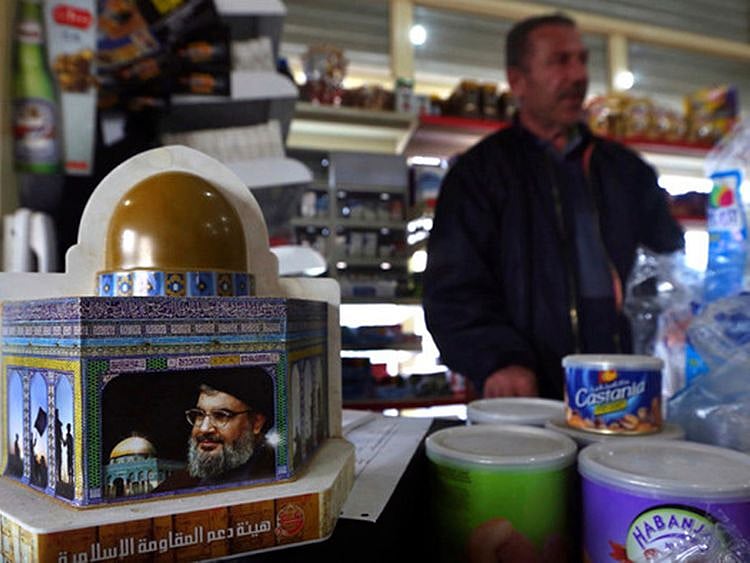Hezbollah donation boxes show Trump's sanctions are hurting Iran
Hezbollah leader on a fund-raising drive and wants everyone to contribute

Highlights
Militant group’s leader had appealed for public contributions
Also In This Package
The militant group's donation boxes, for years placed in shops across Beirut neighborhoods and southern towns, are now also fixed to street poles and have proliferated following an appeal from Hezbollah leader Hassan Nasrallah for greater assistance.
Nasrallah knows well that Hezbollah's social programs and military operations overseas don't come cheap. But he was also anticipating the Trump administration's decision this week to dramatically tighten its sanctions on oil exports from Iran, the Lebanese movement's main financial and military backer.
A U.S. official estimated that assistance at $700 million each year.
The U.S. announcement that it wouldn't renew waivers enabling a handful of countries to buy sizable quantities of crude from Iran was part of its push to roll back the Islamic Republic's influence across the Middle East, from Syria to Yemen.
There are few signs it's succeeding, and analysts say the latest American measures are unlikely to force Iran to immediately shrink its footprint in regional conflicts.
But the steps will add to already daunting challenges facing the country's rulers as they seek to steady a nose-diving economy and maintain support for allies. Hence Nasrallah's concern.
Iran's economy suffer
U.S. sanctions have already slashed Iran's oil revenue and helped trigger a 60 percent fall in the value of the rial over a year.
Shortages, in meat, medicine, even gasoline in some regions, are spreading.
Inflation, which fell significantly following the 2015 international accord that opened Iran's economy for business, is again close to 40 percent. The International Monetary Fund says Iran is staring at its deepest recession since 2012, when U.S. sanctions imposed under Barack Obama peaked.
"The level of financial pain that they will face with this level of sanctions is unprecedented," said Matthew Bey, senior global analyst at Texas-based advisory firm Stratfor Enterprises. "I do not think we can rule out a humanitarian crisis emerging if they cannot access enough hard currency to maintain food imports."
President Donald Trump re-introduced punitive measures last year after pulling the U.S. out of the 2015 deal that gave Iran major sanctions relief in return for curbing its nuclear program.
European powers opposed his campaign, and have created a workaround mechanism that aims to protect trade with Iran.
Their solidarity wasn't enough to save the livelihood of one 42-year-old Iranian, Alireza. He's been unemployed since losing his job with a French company in August. As with many Iranians wary of talking to foreign media, he asked to be identified by first name only.
"The news is unnerving and shows the U.S. wants to put more pressure than before," he said of the decision to scrap oil waivers. "I expect to see higher inflation and a more difficult life for everyone."
Iranian officials have so far struck a defiant tone.
Supreme Leader Ayatollah Ali Khamenei on Wednesday said U.S. actions "won't go unanswered," while Oil Minister Bijan Namdar Zanganeh, in a speech to parliament, declared the U.S. would fail in its stated ambition of eliminating all of Iran's oil exports.
'Break' Sanctions
Zanganeh vowed to "act wholeheartedly to break U.S. sanctions."
In the past, Iran has resorted to discounts, bartering and smuggling to salvage some of its oil income. Iran's Foreign Ministry said that it's holding "intensive consultations" in the region and beyond to limit the impact of waivers being scrapped. China objected to the U.S. unilateral action, while India vowed to keep pushing for relief to buy Iranian oil.
Iran has strengthened economic ties with neighboring Iraq, where multiple militias maintain close links with the Iranian Revolutionary Guard Corps. And it's exporting natural gas to Turkey, and has similar agreements with Armenia and Azerbaijan.
Iran's closest Arab ally, Syria, hasn't done so well. Iraq won't allow Iranian oil to be driven across its territory to the Assad regime in Damascus, probably fearing U.S. retaliation.
Stratfor's Bey said history suggested tighter sanctions on Iran would do little to diminish its enthusiasm for supporting regional partners.
Help to Marry
While that could change, Iranian rulers have plenty of reasons to stick with hired guns like Hezbollah. For one, Tehran relies on its "asymmetric warfare capabilities to deter the U.S. and its allies from engaging in a direct conflict against Iran," Bey said by email.
The U.S. Treasury broadened sanctions last year targeting Hezbollah's financial network in the Middle East and Africa in a bid to crack down on revenue streams the U.S. says the group uses to fund terrorist activities.
Supporters interviewed in Beirut and southern Lebanon said Hezbollah's struggling to pay members and has reduced some benefits, including money for those needing help to marry.
A Lebanese vegetable seller said for now anger is directed at the U.S., not Hezbollah. "But for how long?" he said, speaking on condition of anonymity to discuss a sensitive subject. "There is this cake that you have to distribute to a certain number of people and this cake is getting smaller, what do you expect?"
For Iran the crisis is more challenging at home, where the ruling establishment has faced sporadic unrest for 18 months as living standards deteriorated with the currency collapse.
And there's every likelihood things will get tougher. Trump thinks "that Obama was too soft," said Robert Ford, a former U.S. ambassador to Syria who's now a professor at Yale University. "Expect not less American pressure, expect more."
Sign up for the Daily Briefing
Get the latest news and updates straight to your inbox
Network Links
GN StoreDownload our app
© Al Nisr Publishing LLC 2026. All rights reserved.